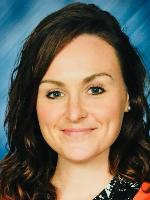

Identify instructional strategies that support the development of student reading and literacy skills outlined by the ISTE Student Standards and Science of Reading
Provide resources and an overview of how to coach and support professional learning needs of educators in the area of reading skill development.
Provide examples of tools that accommodate learner variability and support flexible learning environments during student skill development.
Provide examples of scaffolding to support the integration of these instructional strategies and student learning experiences.
Provide models and examples to help participants visualize how to connect the specific reading strategies to their course content and learning intentions.
Engage participants in an active learning experience to experience sample skill building activities that align to the ISTE Student Standards and best practices for reading skill development.
We will begin by presenting with an interactive activity to get people to activate their prior knowledge about the science of reading. Then we will include a short overview on the “why” and significance for intentionally integrating these best practices when integrating ISTE student standards (10 min)
We will provide a process educators can use to review their current learning targets and standards and identify entry points for developing specific reading skills that correspond with specific ISTE standards. This part of the session will also include audience participation activity. (10 Min)
Specific examples of reading strategies and how the ISTE student standards have been integrated into specific content areas will be shared to help educators visualize what this work and student outcomes can look like. (10-15 min)
We will also share sample rubrics that educators can use to assess student skills for the ISTE standards, student growth in reading skill development, and provide instructional strategies that support formative feedback (7-10 min)
We will share teacher and student and data/collection research artifacts and tools to demonstrate how we are shifting our culture and building a deeper understanding around the integration of high impact reading strategies. (7-10 min)
Answer questions 5 minutes
Language & Cognitive Neuroscience Lab
http://lcnl.wisc.edu/
“Language at the Speed of Sight”
https://psych.wisc.edu/news/professor-seidenbergs-new-book-is-well-received/
Blog: What are the ISTE Standards and Why do they Matter?
https://www.aeseducation.com/blog/what-are-iste-standards
https://udlguidelines.cast.org/
Using Mini Cycles to take Student-Centered Coaching Deeper by Leanna Harris and Diane Sweeney
https://www.dianesweeney.com/using-mini-cycles-to-take-student-centered-coaching-deeper/
Overview of the Coaching Cycle:
https://youtu.be/MWnoPKuBb2M
Hitting the Ground Running with Student-Centered Coaching
http://dianesweeney.com/hitting-ground-running-student-centered-coaching/